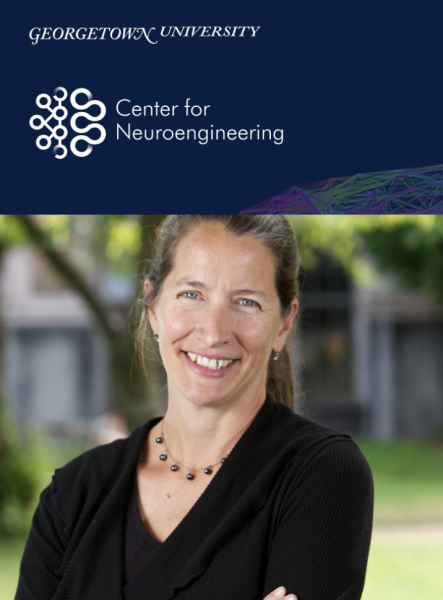A philosophy professor from the University of Washington (UW) discussed her efforts to integrate ethics into neurotechnology research.
The Feb. 21 seminar in Riggs Library, presented by Georgetown University Center for Neuroengineering as part of their Distinguished Speaker Series, featured Sara Goering, chair of UW’s philosophy department. Goering, who also works in UW’s disability studies program and program on ethics, emphasized the importance of ethical considerations in neuroscience research.
Goering focused primarily on her observations while working with UW’s Center for Neurotechnology (CNT), which is dedicated to restoring lost connections in the nervous system to improve sensory and motor function for people with spinal cord injuries. The CNT approached UW’s philosophy department and Goering at the start of the project to seek guidance from an ethicist.
Goering said she and her team of graduate students began by asking those within the CNT about potential ethical questions related to their work.
“All of us live in a world of ethics where we have to think through things in our daily lives and things about our work,” Goering said at the event. “It’s not that they’re outsourcing the ethical discussions to us as philosophers, but rather that we’re going to them to say, ‘How do you think about this? What do you think are the central issues?’”
Goering said research teams often bring in a bioethicist as a short-term consultant, which prevents ethics from being integrated long term into their projects. Goering said she worked with the CNT to enable her graduate students to have regular meetings and journal club readings with the CNT’s neuroscientific partners.
“I think doing little educational things in every activity of the Center meant that our grad students got to know the grad students in the other labs really well because they spent a lot of informal time together, as well as some of the more structured formal time,” Goering said. “That, I think, is one of the things that made this work effectively.”
Goering said she focused on the importance of long-term embedding of ethical thinking in research projects. Because her team of neuroethics fellows also consistently worked with researchers and funding agencies, there was an incentive to understand the wider ethical issues pertinent to research projects.

“Creating a culture isn’t possible simply by adding a consultant,” Goering said. “The time matters. It’s not just having some brief consultation that’s getting to know each other; it’s getting to trust each other over time.”
Although interdisciplinary authorship on publications is usually a sign of successful collaboration, it takes a long time after the conclusion of an experiment for this indication to occur, according to Goering. However, Goering said her team was able to change researchers’ way of thinking quickly.
“Everybody that we talked to recognized the difficulty of showing intel,” Goering said. “But, many of the scientists that we worked with said, ‘I feel like I rethought some of the things that I thought were important in doing this.’”
Dr. Rohan Yarlagadda, a neurology resident at Georgetown University who attended the seminar, said Goering’s talk made him think about integrating ethics into his work in clinical neuroscience.
“There is a greater push to identify some ethical issues that can arise and use that to factor into decision-making,” Yarlagadda told The Hoya. “We’ve been doing that now more on the clinical side, but I think the talk revealed that there’s value to that even in the research realm.”
Yarlagadda said Goering’s discussion presents new ways to quantify success in scientific research along ethical lines.
“While we integrate ethics into our field, I think it’s important to recognize the changes that we are actually enacting,” Yarlagadda said. “Having a good system to measure that is not only helpful in general, but also helps promote widespread adoption of ethics integration.”








